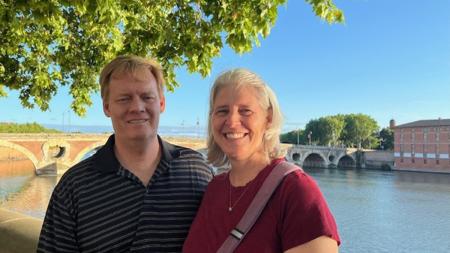Jubilee Fellowship Becomes 100th Church to Join Climate Witness Project

Jubilee Fellowship Christian Reformed Church in St. Catharines, Ont., has become the 100th CRC congregation to sign on to the CRC’s Climate Witness Project (CWP).
Jubilee Fellowship, which joined CWP because its mission of creation care is one that the congregation can strongly support, has been working over the past few years to use less energy and to use it more wisely to reduce effects on the environment.
“Jubilee made a decision to install solar panels on our roof,” said Woodrow Dixon, the church’s pastor. “We also do things like trying to wean ourselves off of plastic disposable, nonreusable cutlery.”
“Creation-care was part of the driving theme for our outdoor service in September,” he added.
Henry Brouwer, professor emeritus of chemistry at Redeemer University College, said Jubilee Fellowship is a congregation that takes its creation stewardship seriously. Besides installing the solar panel to generate some of their own electricity, they have replaced most of their lighting with high efficiency LED lights.
He said he recalls the beautiful day in late September when he met with a group of about 15 seniors at Jubilee Fellowship to talk about the topic "Understanding Climate Change."
“Many people believe that the science of climate change is still uncertain, but after explaining the underlying science associated with this environmental concern and how it relates to God's plan for a healthy earth, the seniors had a much better understanding of why we must be concerned and willing to act as Christians for the sake of future generations,” he said CWP coordinator Steve Mulder noted that reaching 100 churches is an important milestone “because the Climate Witness Project seeks to engage and equip congregations to take the action they deem appropriate through worship, education, energy-saving efforts, and advocacy.”
“Really,” he added, “we are only getting started. There are over a thousand congregations in the CRCNA. Our dream is that they will all respond to our synod's call to action [to address climate change].”
In 2012 the CRC Creation Stewardship Task Force presented its findings in its report to Synod 2012, and synod responded by affirming the task force’s findings and adopting its recommendations.
CWP is one response to synod’s action. A campaign of the Office of Social Justice and World Renew, the project is designed to assist and encourage congregations as they learn about the realities of climate change, as they seek to be better stewards of the resources they have been given, and as they find their voice to speak to public officials about common-sense climate policy that will benefit the earth, people around the world who are poor and vulnerable, and future generations.
All told, more than 750 individuals from over 150 churches representing 16 denominations across the United States and Canada have become partners with CWP and “are acting to protect and nurture God's creation,” said Mulder.
Here are some creation-care success stories from CWP:
- In 2016, Hope Christian Reformed Church in Oak Forest, Ill., became the first congregation in the CRC to be given Energy Star certification from the U.S. Environmental Protection Agency. Hope obtained the designation as a result of its efforts to save electricity, gas, and water.
- In 2015, Valley CRC of Binghamton, N.Y., looked into installing solar panels on its roof, but due to expense, aesthetic, and structural concerns, they decided not to pursue the project at that time. In 2018, however, the option of community solar became available in the area, and it seemed like a natural fit for Valley CRC. Earlier this year, they officially signed up with solar company Nexamp for community solar.
- Centrepointe Community CRC in Edmonton, Alta., has been teaching its children about creation care and has followed up with a special project that includes creating compost bins and planting trees and fruit-bearing shrubs. These elements will be part of a new children’s nature space that Centrepointe is building.
- Meadowlands Fellowship CRC in Ancaster, Ont., recently upgraded its lighting, replacing about 380 fluorescent tubes. This upgrade will reduce the lighting energy demand in the building by about 50 percent.
- On Sept. 27, 2016, the Campus Chapel, a CRC ministry at the University of Michigan, Ann Arbor, turned on 44 rooftop solar panels and began producing its own electricity. This moment was the culmination of a year-long process of exploring options for producing renewable energy for their building.
- Bethany CRC in Gallup, N.Mex., was named a 2017 Cool Congregation Challenge winner by Interfaith Power and Light. Bethany received this honor because of its installation of more than 100 solar panels atop a carport in their church parking lot. The solar energy from the panels now supplies the electrical needs for the church building. As a winner of the challenge, Bethany serves as a strong moral role model in their region, encouraging other churches to follow suit.
Mulder said these churches are models of what CWP is asking churches to do:
- respond with generosity and compassion to people and places affected by climate change, and make efforts to mitigate it. This includes advocating with our governments to commit the necessary financial resources in an effective global framework to assist populations that are bearing the brunt of the negative effects of climate change.
- be voices for justice and public examples in the effort to live sustainably within our God-given resources
- promote stewardship in our own communities and nations
- seek justice for the poor and vulnerable among us and for future generations


